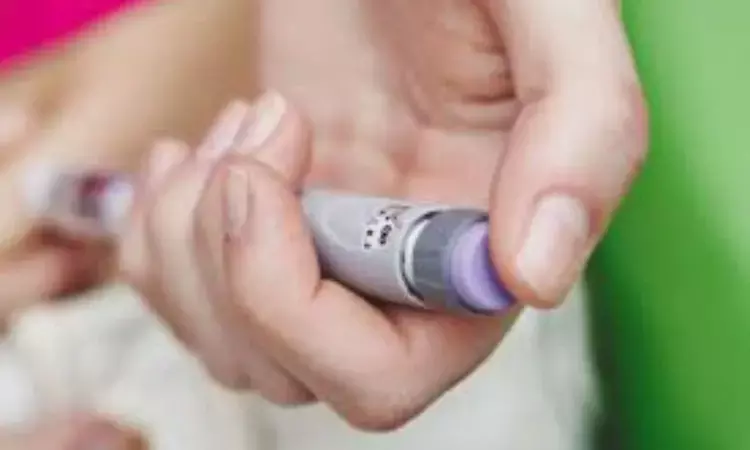- Home
- Medical news & Guidelines
- Anesthesiology
- Cardiology and CTVS
- Critical Care
- Dentistry
- Dermatology
- Diabetes and Endocrinology
- ENT
- Gastroenterology
- Medicine
- Nephrology
- Neurology
- Obstretics-Gynaecology
- Oncology
- Ophthalmology
- Orthopaedics
- Pediatrics-Neonatology
- Psychiatry
- Pulmonology
- Radiology
- Surgery
- Urology
- Laboratory Medicine
- Diet
- Nursing
- Paramedical
- Physiotherapy
- Health news
- Fact Check
- Bone Health Fact Check
- Brain Health Fact Check
- Cancer Related Fact Check
- Child Care Fact Check
- Dental and oral health fact check
- Diabetes and metabolic health fact check
- Diet and Nutrition Fact Check
- Eye and ENT Care Fact Check
- Fitness fact check
- Gut health fact check
- Heart health fact check
- Kidney health fact check
- Medical education fact check
- Men's health fact check
- Respiratory fact check
- Skin and hair care fact check
- Vaccine and Immunization fact check
- Women's health fact check
- AYUSH
- State News
- Andaman and Nicobar Islands
- Andhra Pradesh
- Arunachal Pradesh
- Assam
- Bihar
- Chandigarh
- Chattisgarh
- Dadra and Nagar Haveli
- Daman and Diu
- Delhi
- Goa
- Gujarat
- Haryana
- Himachal Pradesh
- Jammu & Kashmir
- Jharkhand
- Karnataka
- Kerala
- Ladakh
- Lakshadweep
- Madhya Pradesh
- Maharashtra
- Manipur
- Meghalaya
- Mizoram
- Nagaland
- Odisha
- Puducherry
- Punjab
- Rajasthan
- Sikkim
- Tamil Nadu
- Telangana
- Tripura
- Uttar Pradesh
- Uttrakhand
- West Bengal
- Medical Education
- Industry
Once-weekly insulin icodec noninferior to once-daily insulin degludec for HbA1c reduction in type 2 diabetes: ONWARDS 3 trial

Denmark: The ONWARDS 3 randomized clinical trial showed the efficacy of once-weekly insulin icodec treatment in patients with insulin-naive type 2 diabetes.
In the double-masked, double-dummy, randomized trial that included 588 people with type 2 diabetes, the researchers reported that the estimated mean HbA1c change from baseline to week 26 was noninferior with insulin icodec (−1.6 percentage points) compared with insulin degludec (−1.4 percentage points), with confirmed statistical superiority (estimated treatment difference, −0.2 percentage points).
With the progression of type 2 diabetes, insulin treatment may help optimize blood sugar control. Basal insulin initiation is recommended in cases where glucose-lowering agents are insufficient for glycemic control.
Insulin icodec is a once-weekly basal insulin that may improve treatment adherence and acceptance by reducing the number of basal insulin injections from at least 365 per year to 52 per year. Clinical trials have revealed that icodec has a long half-life of about one week, with phase 2 trials in type 2 diabetes patients showing similar safety and efficacy profiles for icodec and once-daily insulin glargine U100.
ONWARDS is a phase 3a clinical trial program that comprises six trials investigating the safety and efficacy of icodec in various clinical scenarios. In the ONWARDS 2 and ONWARDS 4 trials, among participants with insulin-treated type 2 diabetes, HbA1c (haemoglobin A1c) reductions were similar or better with icodec than once-daily insulin glargine U100 or insulin degludec, with no statistically significant differences in level 2 or 3 hypoglycemia rates.
This study, published in JAMA (Journal of the American Medical Association), reports the ONWARDS 3 trial results, which evaluated the safety and efficacy of once-weekly icodec versus once-daily degludec in people with insulin-naive type 2 diabetes.
The trial was conducted from March 2021 to June 2022 at 92 sites in 11 countries in people with type 2 diabetes treated with noninsulin glucose-lowering agents with HbA1c of 7%-11%. 588 (mean age 58 years; 37% are omen) were randomized in the ratio of 1:1 to receive either a once-weekly icodec and once-daily placebo (icodec group; n = 294) or once-daily degludec and once-weekly placebo (degludec group; n = 294). Five hundred sixty-four completed the trial.
The authors reported the following findings:
- Mean HbA1c level decreased from 8.6% (observed) to 7.0% (estimated) at 26 weeks in the icodec group and from 8.5% (observed) to 7.2% (estimated) in the degludec group (estimated treatment difference [ETD], −0.2 percentage points), confirming noninferiority and superiority.
- There were no significant differences between the icodec and degludec groups for fasting plasma glucose change from baseline to week 26 (ETD, 0 mg/dL), mean weekly insulin dose during the last two weeks of treatment, or body weight change from baseline to week 26 (2.8 kg vs 2.3 kg; ETD, 0.46 kg).
- Combined level 2 or 3 hypoglycemia rates were numerically higher in the icodec group than the degludec group from week 0 to 31 (0.31 vs 0.15 events per patient-year exposure) and statistically more elevated in the icodec group from week 0 to 26 (0.35 vs 0.12 events per patient-year exposure).
"Once-weekly icodec demonstrated superior HbA1c reduction than once-daily degludec after 26 weeks of treatment among people with insulin-naive type 2 diabetes," Ildiko Lingvay, the University of Texas Southwestern Medical Center, Dallas, and colleagues wrote.
They noted no difference in weight change and a higher rate of combined level 2 or 3 hypoglycemic events in the context of less than one event per patient-year exposure in both groups.
Reference:
Lingvay I, Asong M, Desouza C, et al. Once-Weekly Insulin Icodec vs Once-Daily Insulin Degludec in Adults With Insulin-Naive Type 2 Diabetes: The ONWARDS 3 Randomized Clinical Trial. JAMA. Published online June 24, 2023. doi:10.1001/jama.2023.11313
Dr Kamal Kant Kohli-MBBS, DTCD- a chest specialist with more than 30 years of practice and a flair for writing clinical articles, Dr Kamal Kant Kohli joined Medical Dialogues as a Chief Editor of Medical News. Besides writing articles, as an editor, he proofreads and verifies all the medical content published on Medical Dialogues including those coming from journals, studies,medical conferences,guidelines etc. Email: drkohli@medicaldialogues.in. Contact no. 011-43720751


